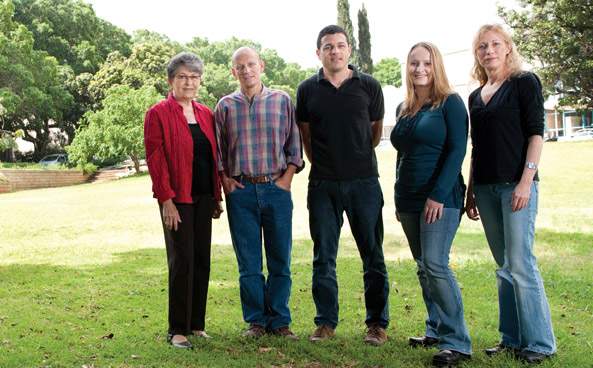עיתונאיות ועיתונאים, הירשמו כאן להודעות לעיתונות שלנו
הירשמו לניוזלטר החודשי שלנו:

“If you want something done, ask a busy person to do it.” On second thought this advice (originally from Lucille Ball), makes quite a bit of sense. So it is no wonder that the protein p53, which works in our cells day and night to keep cancer at bay, has also been handed an important task in embryonic development. This finding emerged from research conducted by Dr. Eldad Tzahor of the Biological Regulation Department, whose expertise includes embryonic development, and Prof. Varda Rotter of the Molecular Cell Biology Department, a pioneer of p53 research.
Sometimes called the “guardian of the genome,” p53 puts the brakes on processes that could lead to cancer when the cell’s genetic material is injured. But scientists who in the past looked for a role for p53 in embryonic development had concluded that its “day job” was keeping it busy enough: “Erasing” the gene in mouse embryos did not affect their development (though, unsurprisingly, they did develop cancer early on). Nonetheless, recent findings hinted at p53 involvement in the process of embryonic cell differentiation, suggesting that the previous conclusion needed reexamining.
“It is illogical to think that a crucial protein like p53 would play no role at all in embryonic development,” says Tzahor. “What actually happens in the mice missing the gene is that the genetic system is completely “rewired” to compensate for the protein’s loss. Other proteins cover for it, and while this enables development to proceed, it also frustrates the efforts of scientists to get at the mechanisms underlying that development.” To overcome this difficulty, the scientists targeted the p53 protein or its activity at only a limited number of sites, and only at certain times, so that the cell didn’t have a chance to cover for the lost protein.
The researchers focused on a group of cells called neural crest cells, which are tied to the development of the face, brain and peripheral nervous system. These early cells differentiate into a number of types, including nerve cells, facial cartilage, pigment-producing cells and more. Before their rapid differentiation, these cells undergo another process, called epithelial mesenchymal transition (EMT), which enables them to begin migrating from their original site in the neural tube – the embryonic template of the central nervous system – to the facial area.
This key process is similar in many respects to processes that cancer cells undergo when they become malignant. And this suggested to the researchers that p53, which is found to malfunction in a high percentage of cancers, might play a role in regulating EMT. To investigate, Tzahor’s group, which included research students Ariel Rinon and Elisha Nathan, and Dr. Rachel Sarig, first asked whether p53 does, after all, play any sort of role in embryonic development. They found that mouse embryos lacking p53 did indeed have mild defects in their facial structure. Next, the team used chicken embryos to pinpoint both the timing and location of p53 activation. Although the protein was present in the neural crest cells, they discovered that it was silenced for the duration of the EMT process.
The researchers concluded that the reduction in p53 was a necessary condition for EMT. To investigate further, they artificially stabilized levels of the protein; and this was the result: EMT was indeed reduced with fewer neural crest cells migrating out of the neural tube, there was a drop in the expression of EMT-related genes and there were structural defects in the face and brain. Conversely, when the researchers delayed p53 activity, they found an excess of neural crest cells along with increased proliferation. Additional experiments with mouse embryonic cells by research student Alina Molchadsky in Rotter’s lab confirmed these findings: Without p53, there is an increase in the expression of genes tied to EMT as well as those involved in cell division. These findings recently appeared in the journal Development.
Neural crest cell migration in a chicken embryo
Tzahor: “p53 puts the brakes on cell division, and this is what prevents cancer. Its levels need to drop for neural crest cells to divide and migrate, but a drop beyond that which takes place naturally during EMT is harmful as well.”
The study’s findings hint that p53 links two parallel developmental processes – cell division/proliferation and EMT. But they may also have relevance for cancer studies: “We have known for a long time that cancer processes are similar to those of embryonic development, only deregulated and uncontrolled,” says Tzahor. “But much less is known about the connections between p53, cell migration and tumor growth. Our study has not only identified yet another job assigned to p53, it also points to promising new directions in cancer research.”
Prof. Varda Rotter's research is supported by the Yad Abraham Research Center for Cancer Diagnostics and Therapy, which she heads; the Women's Health Research Center, which she heads; the Jeanne and Joseph Nissim Family Foundation for Life Sciences; the Leir Charitable Foundations; the Centre Leon Berard Lyon; Donald Schwarz, Sherman Oaks, CA; and the estate of John M. Lang. Prof. Rotter is the incumbent of the Norman and Helen Asher Professorial Chair of Cancer Research.
Dr. Eldad Tzahor's research is supported by the Kahn Family Research Center for Systems Biology of the Human Cell; the Helen and Martin Kimmel Institute for Stem Cell Research; the Kirk Center for Childhood Cancer and Immunological Disorders; the Jeanne and Joseph Nissim Foundation for Life Sciences Research; the Yeda-Sela Center for Basic Research; the estate of Jack Gitlitz; the Women's Health Research Center funded by the Bennett-Pritzker Endowment Fund, the Marvelle Koffler Program for Breast Cancer Research, the Harry and Jeanette Weinberg Women's Health Research Endowment and the Oprah Winfrey Biomedical Research Fund; and the estate of Fannie Sherr. Dr. Tzahor is the incumbent of the Gertrude and Philip Nollman Career Development Chair.